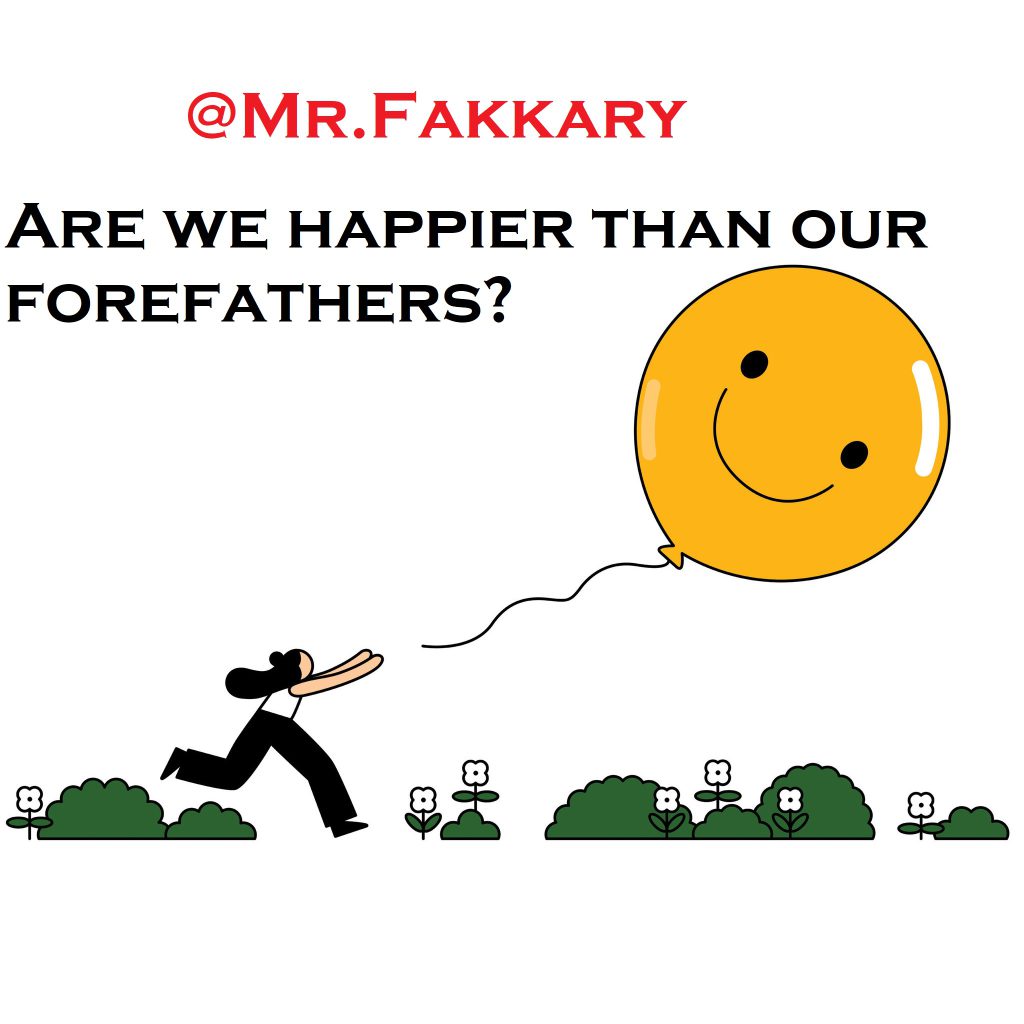Are We Happier than Our Forefathers?
Never would one answer ‘yes’ to this question if he had the chance of living even for a short span in the tranquil society of the past. No doubt that the modem man enjoys the production and consumption of the goods which our forefathers could not even imagine; no doubt that all the impossibilities have become possible thanks to technology. Today an average citizen enjoys the facilities which even the kings and emperors of the ancient times did not have access to. If we think that happiness consists of material comfort, no doubt we are happier than our forefathers. If pleasure can be called happiness, we are indeed happier.
But for us the benchmark of happiness is not rolling in whatever we can think about. Modem life has all done away with happy life. Modem life has taught us to be for ourselves. Modem life has taught us to stand aloof from the simple, ordinary people who live in our vicinity. Overtaking others because of not lagging behind has become the only purpose in everybody’s life. Our modem life with an LED with the size of a wall monitor in our luxurious houses does not allow us to be happier than our forefathers. We get too mesmerized by this source of second hand enjoyment that we never take any notice of the feelings of our own family folks let alone to hear any cry for help from the other side of the fence. The days when walls made no sense for the kind-hearted neighbors are gone. The days when two neighbors were so confidential that they would confide their secrets to each other are gone. Today, you would be surprised, if a person knows who lives next door. This cold-blooded fashion of life leaves no room for happiness.
On the other hand, our forefathers led a Spartan life. Although it was a life with no comfort or luxury, it was simple but replete with happiness. This is a persuasive evidence to our claim. They went through life in a happy-go-lucky fashion. They had fewer wants and they were satisfied with what they earned by working hard. They were strong, sturdy, and healthy and would extremely enjoy simple things of life. An 85-years-old father was undoubtedly satisfied and happy with his mono-wave old radio. He lived a contented and peaceful life.
Today, people are confined in their hive-like flats in total solitude. In our forefathers’ time, neighbors used to meet up every now and then to exchange their news and views and reminisce about the past. They shared their happiness and expressed sympathy over each other’s sorrows. They preserved their fellowship. That was the true meaning of happiness for them. Our forefathers enjoyed sheer peace and quiet. Stress, agitation, jealousy, hypocrisy, and the words likewise hardly ever existed in their simple lives. Their underdeveloped small village abounded in honesty. No one had a cunning character. No one made constant effort to besmirch their fellows. You could never find anyone with unscrupulous behavior.
Apart from these humanistic approaches to life, they never ever had the sort of social problems we face today. Nowadays city life is full of noise and congestion, hustle and bustle, and hurry and worry. Life is millions of stress and tension. Today stress-related diseases have wrested the healthy lifestyle from modem men. You can find long queues in front of doctors’ offices. People buy medicines more than their groceries. Once I happened to talk with an old man of seventy who was quite knackered in one of those queues. He was there for his son’s asthma. I asked him if he ever felt happier than his son. His frank and honest reply was sufficient enough to make everything clear for me. He said he had never taken any medicines during his lifetime.
Today there is pleasure but no contentment. We do not have peace of mind; we have totally been perplexed by our mechanical life; we have been surrounded by modem machines; we have been captured by the remote controls; we do not need to move a finger or stand up; we have them at our disposal. We have become couch potatoes and new technology is to blame. We have completely turned into a lazy generation. Can a lazy generation enjoy happiness? Of course, NOT.
The counter – argument: key sentences
Develop the following ideas to disagree with the text.
- People live in total excitement today. We can’t stop them.
- Hustle and bustle, hurry and worry keep the people away from a lackluster life.
- Happiness was the only thing people had in past. Today people have a variety of things besides happiness.
- In past, people worked from morning till night. They could not have time to experience happiness.
- Exhausted parents did go to bed when the night was still young.
- Is it really annoying to have everything in your house?
- Was it really happiness to live in a filthy environment?
- With no electricity, it was impossible to experience happiness in darkness.
- Our busy lives do not allow our neighbor to stick his nose into our personal or family affairs. This is certainly good.
- Neighbors are usually nosy.
- Speedy people of today could never tolerate the monotonous life of the past.
- Listening to old stories was the only way of enjoyment in past which is not comparable to what we have today.
- One needs to release the stored energy. Listening to radio can hardly be one way to do so.
- Our old eighty-five years-old father was satisfied with his radio since there was no other means of mass media.
- He was satisfied since his village was his world.
- If there is dishonesty, it is better to live for yourself.
- We must count our blessings or else they will disappear.
- If you remember how difficult it was to make a phone call, you would never talk in favor of the past.
- Disadvantages of the cell phone can easily fall on our blind eye right after we make an emergency call. Isn’t this happiness?
- Stress and agitation are parts of our lives. To enjoy life we need to cope with them.







